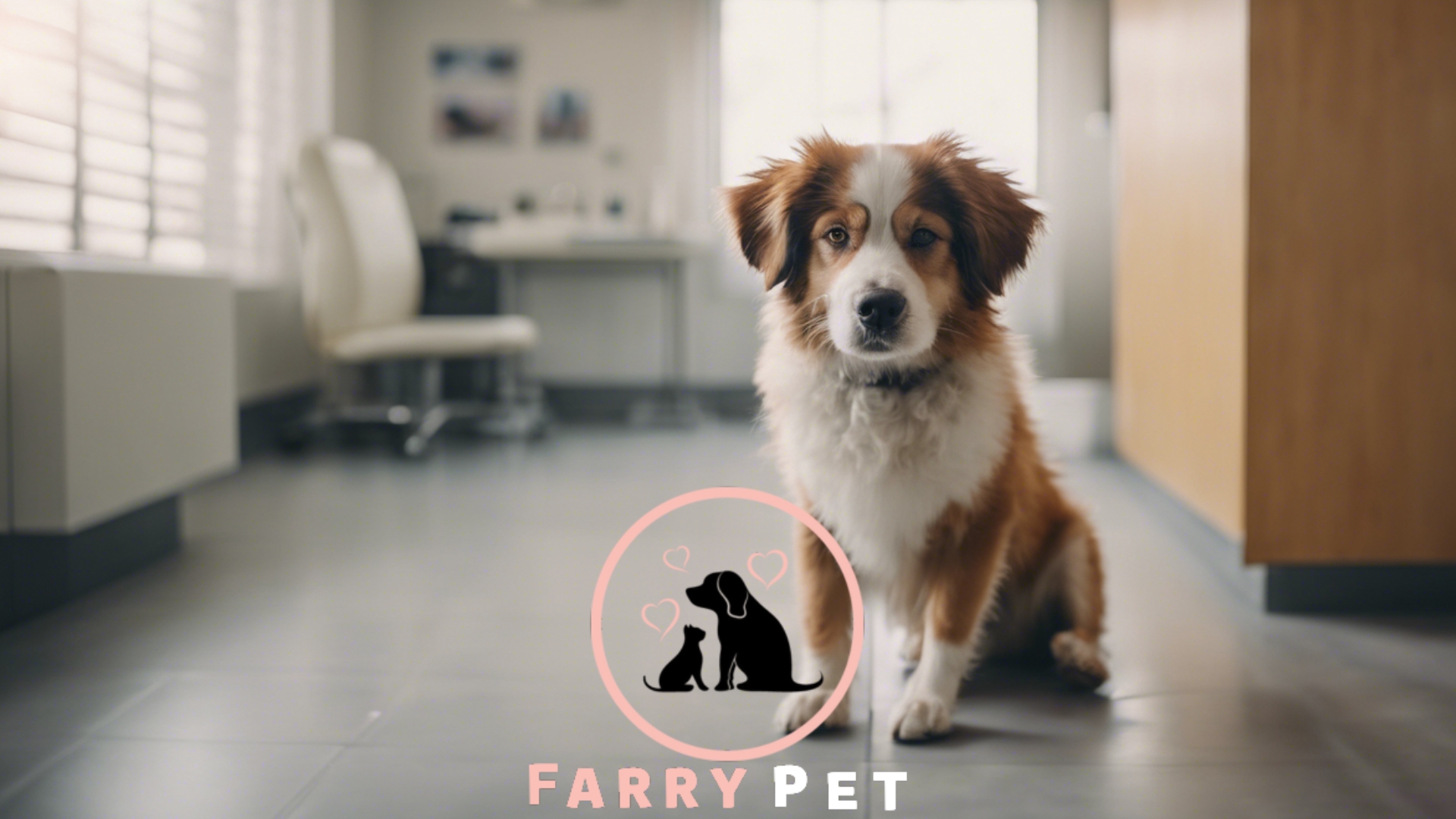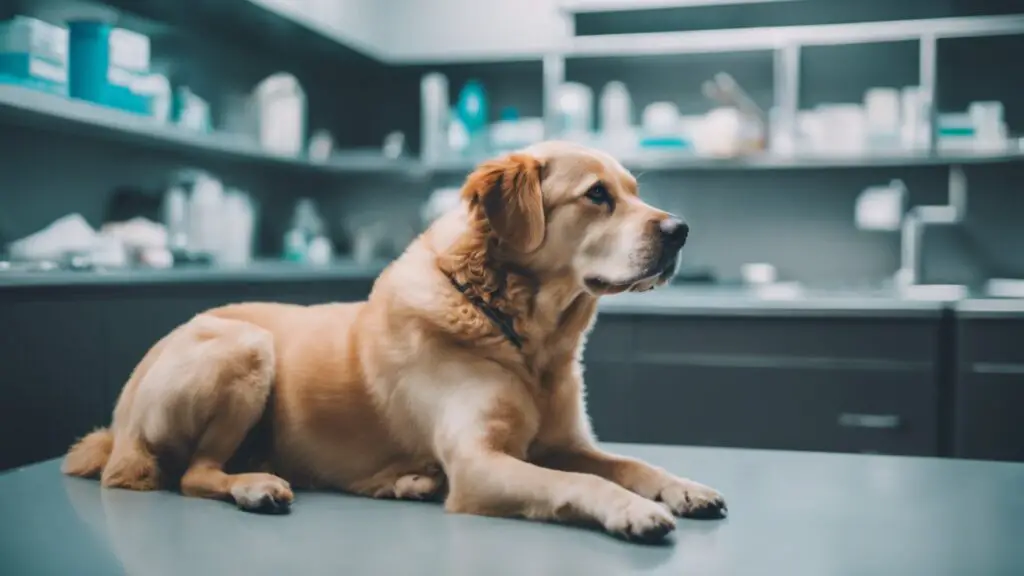
Take your dog to the vet for diarrhea if it persists for more than two days or is accompanied by vomiting, lethargy, or blood. Early vet intervention can prevent dehydration and address underlying issues.
Diarrhea in dogs can be a common occurrence, yet it sometimes signals something more serious than a simple upset stomach. Pet owners need to recognize when professional medical attention is necessary.
Spotting the signs early, such as changes in stool consistency or frequency, helps address potential health concerns swiftly.
Diarrhea that’s frequent and lasts over 48 hours poses risks of dehydration and indicates possibly severe conditions. Other red flags include the dog acting unusually tired, any presence of blood in the stool, or if they seem to be in pain.
Remember that consistent, urgent veterinary care ensures our furry friends recover quickly and maintain their health.
Recognizing Diarrhea in Dogs
Diarrhea can be an uncomfortable issue for your furry friend. Dogs, like humans, sometimes experience digestive disturbances.
Knowing when it’s a simple upset stomach or a sign of something more serious requires attention to detail. Quick detection and the right action can make all the difference in your dog’s health.
Identifying Symptoms
Diarrhea in dogs manifests through several clear signs. Here are what to look out for:
- Increase in defecation frequency
- Loose or liquid stool
- Changes in stool color or smell
Be vigilant about other possible symptoms like bloating, lethargy, or loss of appetite. These can indicate more severe health issues.
Assessing Severity
Not all cases of diarrhea warrant a vet visit. Answer these questions to assess the situation:
| Question | Action |
|---|---|
| Has diarrhea lasted more than 48 hours? | Seek vet care. |
| Are there signs of blood? | Seek vet care. |
| Is your dog dehydrated? | Seek vet care. |
| Is your dog acting normal? | Monitor at home. |
Home Care vs. Professional Care
Deciding between home remedies and professional help depends on your dog’s condition:
- Home Care: If symptoms are mild and your dog behaves normally, try offering a bland diet and ensure access to fresh water. Keep an eye on their stool consistency.
- Professional Care: Symptoms that persist for more than two days, involve blood, or are accompanied by vomiting and lethargy need vet attention. Dehydration and extreme changes in behavior are also red flags.
Common Causes of Diarrhea
Seeing your furry friend suffer from diarrhea is troubling. Diarrhea can stem from simple causes or signal underlying health issues.
Understanding what could be upsetting your dog’s digestive system is crucial. Here’s a breakdown of the common culprits.
Dietary Indiscretions
Dogs often eat things they shouldn’t. Consuming garbage, spoiled food, or abrupt diet changes can trigger an upset stomach. This can lead to occasional, acute diarrhea.
- Garbage and spoiled food
- Sudden changes in diet
- Consuming non-food items
Infections and Parasites
Bacterial and viral infections like parvovirus or giardia can cause severe diarrhea in dogs.
Parasites like roundworms or hookworms are also frequent offenders. Regular vet visits can help prevent these infections.
| Infection Type | Examples |
|---|---|
| Bacterial | Salmonella, E. coli |
| Viral | Parvovirus, Coronavirus |
| Parasites | Giardia, Roundworms |
Chronic Conditions
Some dogs battle chronic conditions that trigger diarrhea. Inflammatory Bowel Disease (IBD) and food sensitivities are among these.
Regular check-ups can manage these conditions for a healthier gut.
- Inflammatory Bowel Disease
- Food allergies and sensitivities
- Some cancers
- Colitis
When Immediate Vet Care is Necessary
Diarrhea can be a common issue in dogs. But sometimes, it signals something more serious. Knowing when to seek immediate vet care saves lives.
Do not wait if you observe alarming symptoms. Your furry friend’s health is precious. Prompt attention is crucial when they show distress signs.
Danger Signs to Watch for
Some symptoms suggest your dog needs a vet now. These danger signs must not be ignored:
- Blood in stool: A red flag for internal problems.
- Vomiting: When paired with diarrhea, indicates urgent issues.
- Lethargy: A sign their body is under stress.
- Unusual whining or agitation: Pain or discomfort may be the cause.
- Dehydration: Check for dry gums or a lack of elasticity in the skin.
- Loss of appetite: A telltale sign of health disturbances.
Puppies and Senior Dogs: Special Considerations
Puppies and older dogs have weaker immune systems. They need extra care. Diarrhea in these age groups may quickly lead to dehydration. It can signal severe health threats.
Do not wait to act if your puppy or senior dog has diarrhea.
| Puppies | Senior Dogs |
| Get vet care if: | Get vet care if: |
| Diarrhea persists beyond 24 hours. | Diarrhea is consistent or worsening. |
| They are vomiting repeatedly. | There’s a sudden change in bowel habits. |
| They show signs of distress or pain. | They display increased weakness or lethargy. |
Preparing for the Vet Visit
Is your dog suffering from diarrhea? Knowing when to take your furry friend to the vet is crucial. Spotting the signs early can help your vet make a timely diagnosis.
Before you rush to the clinic, proper preparation is key for an effective visit. Here’s what you need to do.
Collecting a Stool Sample
Collecting a sample of your dog’s stool is a critical first step. This helps the vet determine the cause of the diarrhea.
- Use a clean plastic bag or container.
- Gather a small amount from the freshest stool.
- Seal it well to avoid contamination.
- Remember to label it with your dog’s name and the date.
Documenting Your Dog’s Condition
Keep a detailed record of your dog’s symptoms and behavior. This helps your vet pinpoint the issue more accurately. Repeat rows as necessary
| Date | Symptom | Frequency | Severity |
|---|---|---|---|
| Example: 04/12/2023 | Lethargy | 3 times a day | Moderate |
List of Medications and Diet
Create a list of all medications your dog is taking. Include information about your dog’s regular diet and any recent changes.
- Name and dosage of medication
- Type of food and feeding schedule
- Any new treats or food items introduced
- Possible dietary indiscretions
What to Expect During the Vet Examination
When your dog has diarrhea, a trip to the vet is important for their health. A few steps will help diagnose and treat your furry friend during the vet examination.
Understanding the vet’s process can ease worries and prepare you for the visit.
Diagnostic Tests
The vet may start with various tests to better understand your dog’s condition. These tests include:
- Fecal exam: Checks stool for parasites and bacteria.
- Blood test: Reveals overall health and organ function.
- X-rays or ultrasound: Views inside the belly for obstructions or other issues.
Treatment Options
After diagnosis, the vet will discuss treatment. Treatment options vary based on the cause and may include:
- Dietary changes: Temporary bland diet or special food.
- Medication: Antibiotics or anti-parasitics if infection is found.
- Fluid therapy: Replenishes lost fluids if dehydration occurs.
Follow-up Care
Post-treatment, follow-up care ensures recovery.
- Revisit the vet: Confirm your dog’s return to health.
- Monitor symptoms: Watch for diarrhea return or other issues.
- Stick to vet recommendations: Continue any prescribed diet or medication.
Remember, prompt vet care is crucial for any persistent diarrhea in dogs. Your dog will be on the fast track to recovery with proper medical attention.
Preventing Future Episodes
After a worrying bout of diarrhea, your beloved pooch returns to their playful self. But, as a pet parent, it’s crucial to prevent future health mishaps.
Each pet is unique, and so is their digestive system. This post outlines vital steps to deter diarrhea episodes and keep your dog healthy and happy.
Dietary Management
Proper diet is key to a healthy digestive system. Knowing what to feed your dog is pivotal in preventing stomach upset. Ensure the following dietary precautions:
- Consistent Feeding Schedule: Stick to regular meal times.
- High-Quality Food: Choose brands with balanced nutrition.
- Portion Control: Avoid overfeeding; it puts strain on the gut.
Introducing new food slowly can help their stomachs adjust without distress. Always have fresh water available to aid digestion.
Regular Health Check-ups
Routine veterinary exams are fundamental. These check-ups can catch issues before they escalate. Remember:
- Annual Vet Visits: For a health overview and vaccinations.
- Parasite Prevention: Deworming and flea control are musts.
- Dental Care: Oral health impacts digestion, too.
Identifying and Avoiding Triggers
Dogs react differently to various stimuli, which can upset their stomachs. Take note:
- Food Sensitivities: Watch for reactions post-feeding.
- Stress Factors: Reduce anxiety-inducing situations.
- Environmental Changes: Keep surroundings stable when possible.
Keep a diary of episodes to track potential triggers. Discuss any patterns with your vet.

Frequently Asked Questions
What If Your Dog Has Diarrhea for 3 Days?
Consult a vet immediately if your dog has diarrhea for three days. Continuous diarrhea can lead to dehydration and may indicate an underlying health issue.
What Is Considered Excessive Diarrhea in Dogs?
Excessive diarrhea in dogs typically means passing loose, watery stools more than three times a day. Immediate veterinary attention is advised to prevent dehydration and address underlying causes.
Should I Be Worried If My Dog Has Diarrhea But is Acting Fine?
Mild diarrhea in dogs acting normally can be temporary. Monitor them closely and ensure they stay hydrated. Seek veterinary advice if diarrhea persists beyond 24 hours or worsens to ensure their health isn’t compromised.
How Much Will It Cost to Take My Dog to the Vet for Diarrhea?
The cost of a vet visit for dog diarrhea varies, typically ranging from $50 to $200. Factors affecting price include location, tests, and treatments required.
How Often is Dog Diarrhea An Emergency?
Diarrhea persisting beyond two days or accompanied by severe symptoms like blood, vomiting, or lethargy warrants immediate veterinary attention.
Conclusion
Understanding your dog’s health is vital for any pet owner. Promptly recognizing signs of distress, like diarrhea, can prevent serious issues.
Always consult with your vet when symptoms persist or seem severe. Caring for our furry friends means acting swiftly for their well-being.
Trust your instincts—you know your pet the best.






